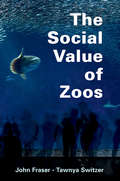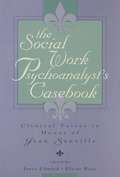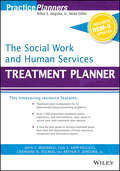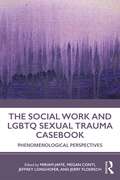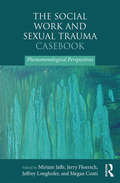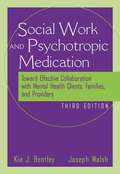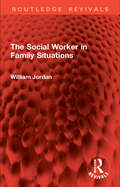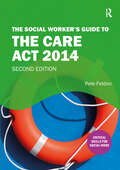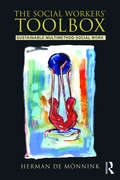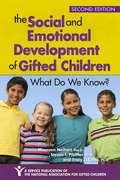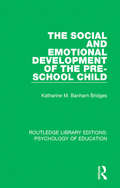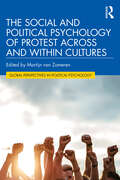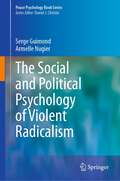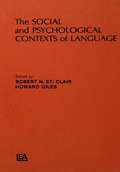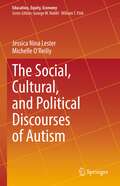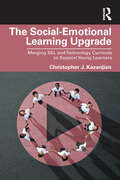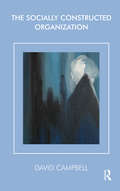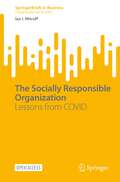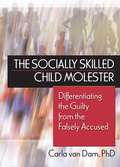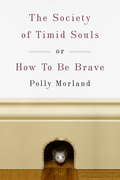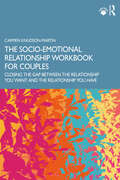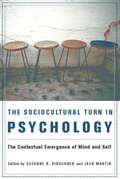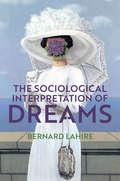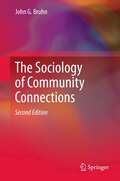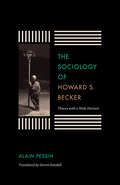- Table View
- List View
The Social Value of Zoos
by John Fraser Tawnya SwitzerCombining anecdotes with scientific data, this book is a journalistic inquiry into what is currently known about zoos and aquariums as sociocultural intersections of mission, public perception, and on-site meaning making. The authors draw on conservation psychology and other social science research to explore how zoos might develop and deliver more effective learning experiences to promote and nurture conservation values and collective action. While people use zoos with specific priorities and motivations in mind, these are social settings. Indeed, it is because they represent an important, vast, and trusted social enterprise that zoos have such powerful opportunities to change how diverse public audiences view, value, identify, and engage with animals and the broader biophysical environment.
The Social Work Psychoanalyst's Casebook: Clinical Voices in Honor of Jean Sanville
by Joyce Edward Elaine RoseThe Social Work Psychoanalyst's Casebook begins with an interview with Dr. Sanville, who reflects on her evolution as a social work analyst, theoretician, writer, teacher, and leader. These reminiscences are followed by accounts of nine analytic treatments, each of which offers an unusual window into what actually transpired between analyst and analysand during the treatment hours. These case studies concern particularly troubled, often traumatized patients-the very "hard to reach" or "difficult to treat" clients with whom social workers have long been familiar. They include a reanalysis by the same analyst of a patient whose first therapy ended in a stalemate; an account of transference and countertransference phenomena during termination; a report on the analysis of a young woman who experienced both chronic and stress-related trauma; and an account of the special issues involved in the treatment of an aging woman. Most of the case studies reflect the influence of Dr. Sanville, whose work has long evinced the therapeutic imagination and disciplined creativity to which all the contributors aspire. Tthe contributors to this volume offer the salutary reminder that analytic work is built on a relationship of respect and empathy and that treatment success follows from the therapist's willingness to accommodate the unique needs of individual patients. In honoring Jean Sanville, The Social Work Psychoanalyst's Casebook speaks to the robustness of a multidisciplinary approach to psychopathology that transcends the bounds of any single profession-an approach in which contemporary psychoanalysis is enlarged by the insights and emphases of social work just as social work is enriched by the clinical wisdom of psychoanalysis.
The Social Work and Human Services Treatment Planner, with DSM 5 Updates
by Arthur E. Jongsma Jr. Catherine N. Dulmus John S. Wodarski Lisa A. Rapp-PaglicciThis timesaving resource features: Treatment plan components for 32 behaviorally based presenting problems Over 1,000 prewritten treatment goals, objectives, and interventions--plus space to record your own treatment plan options A step-by-step guide to writing treatment plans that meet the requirements of most insurance companies and third-party payors The Social Work and Human Services Treatment Planner provides all the elements necessary to quickly and easily develop formal treatment plans that satisfy the demands of HMOs, managed care companies, third-party payers, and state and federal review agencies. Saves you hours of time-consuming paperwork, yet offers the freedom to develop customized treatment plans to address clients' psychological and environmental problems and issues Organized around 32 main presenting problems, from family violence and juvenile delinquency to homelessness, chemical dependence, physical/cognitive disability, sexual abuse, and more Over 1,000 well-crafted, clear statements describe the behavioral manifestations of each relational problem, long-term goals, short-term objectives, and clinically tested treatment options Easy-to-use reference format helps locate treatment plan components by behavioral problem or DSM-5 diagnosis Includes a sample treatment plan that conforms to the requirements of most third-party payers and accrediting agencies (including TJC and NCQA)
The Social Work and LGBTQ Sexual Trauma Casebook: Phenomenological Perspectives
by Jerry Floersch Jeffrey Longhofer Miriam Jaffe Megan ContiThis inspiring text offers a collection of case studies from expert clinical social workers who work closely with survivors of LGBTQ-related sexual trauma. The book covers a wide range of topics, such as gender and sexual minority asylum seekers, the embodiment of queer identity, the role of religion, regionality in the LGBTQ experience, and effective use of gay affirmative therapy. Each chapter is framed by key questions that encourage students and mental health practitioners to "think through" the specific needs and challenges of LGBTQ individuals who have experienced sexual trauma. Additional resources include an example of effective supervision and an example of a case conceptualization. Drawing on the importance of narrative social work and the record of experience it provides, The Social Work and LGBTQ Sexual Trauma Casebook is an essential text for students and clinical social workers working with LGBTQ survivors of sexual trauma.
The Social Work and Sexual Trauma Casebook: Phenomenological Perspectives
by Jerry Floersch Jeffrey Longhofer Miriam Jaffe Megan ContiThis volume offers a collection of ten case studies from clinical social workers who work in the field of sexual trauma, with the objective of challenging and informing social work practice with survivors and perpetrators of sexual trauma. These steps are meant to help the process of treatment by breaking down the experience of trauma to a set of steps and interventions aimed at resolving traumatic symptoms within a given time frame. Our text seeks to challenge the tendency towards reductionism inherent in the dominant social paradigm by encouraging the development of a phenomenological and interdisciplinary approach to understanding sexual trauma. In doing so, the examples of interventions presented in each case study reflect practice methods that honor the complexity of the human experience of sexual trauma, suffering, and recovery.
The Social Worker and Psychotropic Medication: Toward Effective Collaboration with Mental Health Clients, Families, and Providers (3rd edition)
by Joseph Walsh Kia J. BentleyIntended for social workers who want to understand the drugs prescribed to their clients, this text describes the central nervous system, the basic principles of pharmacology, and the specific disorders treated by antipsychotics, antidepressants, mood stabilizers, anti-anxiety drugs, and psychostimulants. The third edition reflects new medications and new uses of medications across diagnostic categories.
The Social Worker in Family Situations (Routledge Revivals)
by William JordanFirst published in 1972, The Social Worker in Family Situations sets out to provide a theoretical basis for the practice of the family casework approach. William Jordan studies those families whose members flee from emotional involvement with each other, stressing their individual autonomy and the dangers of close family ties. He concentrates on the problems of working with these ‘centrifugal’ families, examining the implications of their patterns of interaction not only within the nuclear family group, but also in the extended family, the neighbourhood and the community.The book will be of great interest to all social workers, including those who have practised the family casework approach for many years but have hitherto lacked the benefit of any helpful written guidance.
The Social Worker's Guide to the Care Act 2014
by Pete FeldonThis best-selling book helps social workers gain a comprehensive understanding of how to achieve best practice in applying the Care Act 2014.The Care Act 2014 is a pivotal piece of legislation for adults with social care needs. It is particularly important for social workers, as it sets out the legislative context for the core social work processes that apply to all adults.The Social Worker’s Guide to the Care Act 2014 is a thoughtfully crafted resource that places social workers at the centre of the legal landscape. It takes a distinctive approach by honing in on what truly matters to social workers: assessing needs and formulating care and support plans that align with eligible requirements.Through a blend of key concepts, case examples, and critical evaluation, the book enhances legal literacy in a way that empowers social workers. It equips social workers with a clear understanding of the legal framework within which they operate, enabling them to make informed professional judgements and apply their expertise effectively.This eagerly awaited second edition reflects extensive revisions based on valuable insights derived from judicial reviews, Ombudsman decisions, and in-depth research. Drawing from the author's extensive experience in providing training on the Care Act, the revised edition introduces two new sections that delve into the realms of professional judgement and defensible decisions—essential areas of focus for social workers. Additionally, it incorporates the amendments made to the Care Act 2014 by the Health and Care Act 2022.This substantially revised second edition of The Social Worker's Guide to the Care Act 2014 will be your invaluable companion in navigating the complexities of social work and will be a source of knowledge, empowerment, and guidance.
The Social Workers' Toolbox: Sustainable Multimethod Social Work
by Herman de MönninkThe Social Workers' Toolbox aims to bring order to the diversity of tools which are so characteristic of social work: assessment tools, practice tools and outcome-measurement tools. The tools described in this Toolbox can be directly put into practice and adapted to the social workers’ personalized approach with their individual clients and their environments. The underlying meta-theory for Sustainable Multimethod Social Work is the ‘PIE-Empowerment Theory’. This theory defines social work practice in terms of the partnership between social worker and client and is aimed at enhancing quality of life through systematically and sustainably addressing human needs and human rights. The multimethod model promotes the flexible combination of well-written evidence- and practice-based tools. Packed full of useful checklists, the Toolbox is ideal reading for both inexperienced and more practiced social workers. The book provides a solid basis through the use of practical examples. For the more experienced social worker it offers a substantial resource and the means to legitimize a chosen course of action and social work intervention. Schools of social work will be able to use the book as an easily accessible resource for social work assessments, interventions and quality social work management.
The Social and Emotional Development of Gifted Children
by Maureen Neihart Tracy Cross Steven PfeifferThe Social and Emotional Development of Gifted Children remains the only book that provides a comprehensive summary of the empirical research on the social and emotional development of gifted children by leading authorities in the field. It includes several features that make it the leading text on what we know about the social and emotional development of gifted children. For example, it summarizes the most significant findings from the empirical research on the topic. It also includes noteworthy variations that have been observed across cultural groups or global contexts. Each chapter also provides a short description of the practical applications that can be made from the research. This second edition includes an entirely new section on the psychosocial aspects of talent development, as well as addresses the burgeoning interest and research base regarding gifted performance. The text also includes several new topics that have emerged from the research in the past decade, such as the neuroscience of talent development and motivation for talent development. This book is a service publication of the National Association for Gifted Children.
The Social and Emotional Development of the Pre-School Child (Routledge Library Editions: Psychology of Education)
by Katharine M. Banham BridgesOriginally published in 1931, the study reported in this book was undertaken as part of the research programme of the Canadian National Committee for Mental Hygiene. It represents a systematic inquiry into the social and emotional behaviour of pre-school children as observed from day to day in a nursery school. The study extended over a period of three years, and it concerned children between the ages of two and five years who were in attendance at the McGill University Nursery School and child laboratory. It can now be read and enjoyed in its historical context.
The Social and Political Psychology of Protest Across and Within Cultures (Global Perspectives in Political Psychology)
by Martijn Van ZomerenThis topical book explores the phenomenon of when and why people protest. Based on social and political psychology, the book takes a comparative approach across and within cultures and examines how human motivation and political and cultural contexts affect protests.Showcasing state-of-the-art chapters from a new generation of social protest researchers, the book offers an overview of research into contemporary social change over the last decade. It draws on interdisciplinary research from social and political psychology across and within cultures to increase the scope of the phenomenon of social protest. The chapters feature different international examples and discuss diverse manifestations of social protest. Each chapter explicitly connects key insights to the practice and real-life relevance of social protest.The book offers a unique perspective of the when and why of social protest, and will be essential reading for students and academics in the fields of social psychology, political psychology, politics, and sociology, as well as anyone in behavioural and social sciences interested in social movements, social protest, and social change.
The Social and Political Psychology of Violent Radicalism (Peace Psychology Book Series)
by Serge Guimond Armelle NugierThis book provides a unique perspective on the perpetrators and victims of political violence, using original evidence from the deadly attacks perpetrated in Paris in 2015. Much of the current literature focuses on the perpetrators of such violence. This volume, however, offers a deeper analysis by focusing not only on the terrorists themselves but on understanding the reactions of the general population affected by such lethal acts. It provides a more detailed view of the opponents of terrorism, namely us, and explains how our own reactions can increase or decrease, the potential for political violence. Part I introduces the most relevant theories within social psychology and political psychology that are used to understand terrorism; Part II examines empirical evidence from a French context; and Part III discusses policy implications, with the prevention of political violence as a long-term goal. Finally, the volume offers a blueprint for a more appropriate conceptualization of terrorism as arising out of intergroup conflict suggesting ways to build a resilient society. This book will be of interest to researchers, teachers and students across social psychology, sociology, political psychology and political science.
The Social and Psychological Contexts of Language
by Howard Giles Robert N. St. ClairPublished in the year 1982, The Social and Psychological Contexts of Language is a valuable contribution to the field of Social Psychology.
The Social, Cultural, and Political Discourses of Autism (Education, Equity, Economy #9)
by Michelle O'Reilly Jessica Nina LesterTaking up a social constructionist position, this book illustrates the social and cultural construction of autism as made visible in everyday, educational, institutional and historical discourses, alongside a careful consideration of the bodily and material realities of embodied differences. The authors highlight the economic consequences of a disabling culture, and explore how autism fits within broader arguments related to normality, abnormality and stigma. To do this, they provide a theoretically and historically grounded discussion of autism—one designed to layer and complicate the discussions that surround autism and disability in schools, health clinics, and society writ large. In addition, they locate this discussion across two contexts – the US and the UK – and draw upon empirical examples to illustrate the key points. Located at the intersection of critical disability studies and discourse studies, the book offers a critical reframing of autism and childhood mental health disorders more generally.
The Social-Emotional Learning Upgrade: Merging SEL and Technology Curricula to Support Young Learners
by Christopher J. KazanjianThe Social-Emotional Learning Upgrade explores how today’s educators can connect two previously separated but important curricula in their schools: social-emotional learning (SEL) and educational technology. With schools’ SEL efforts pressed for time and resources and digital engagements often limited to skill development, K-12 students risk being unprepared to sustain their well-being and personal opportunities in a rapidly changing, technology-dependent world. Driven by a paradigm that synthesizes multicultural education and humanistic psychology, this book readies educators to implement SEL curricula that will support young learners as they navigate constant social and technological flux and that will nurture their unique perceptions of reality, their aspirations, and their mental and physical health. Each chapter’s novel insights will help to mitigate both student disengagement and teacher demoralization, enabling classroom pedagogies and the process of schooling to better align with the ways in which learners explore, express, and create meaning. Guiding pre-service teachers, leaders, and curriculum developers beyond common goals such as digital skills development, content mastery, or standardized testing, this volume focuses instead on complex digital literacies, collaborative experiences, problem- and project-based learning, culturally relevant pedagogies, and overall holistic growth.
The Socially Constructed Organization (The Systemic Thinking and Practice Series)
by David CampbellThis book presents the dynamics of organisations from a social constructionist viewpoint, taking the organisation as something that is constructed continuously through individual interactions with others, both within and without the organisation.
The Socially Responsible Organization: Lessons from COVID (SpringerBriefs in Business)
by Ian I. MitroffThis book explores the nature of the socially responsible organization, specifically the role of crisis management in creating a socially responsible organization. It applies the Myers-Briggs Personality Typology (MBPTI) and the Thomas-Kilmann Conflict Framework to issues such as responses to the COVID-19 pandemic, regulation of tech companies, and infrastructure. Dr. Mitroff lists the major arguments given in regards to these issues and subjects them to the strongest possible scrutiny and critique to hold both individuals and organizations accountable to the larger responsibilities we share as global citizens. This is an open access book.
The Socially Skilled Child Molester: Differentiating the Guilty from the Falsely Accused
by Carla Van DamKnow what signs indicate a child molester!Revealing the secret but successful strategies used by child molesters allows adults to intervene long before children are abused. The Socially Skilled Child Molester: Differentiating the Guilty from the Falsely Accused identifies how socially proficient molesters successfully ingratiate themselves into families and communities. The book closely examines their techniques and strategies while detailing the tools for prevention. The difficult issue of false accusation is tackled by learning the distinctions that clearly differentiate the actions of the guilty from those who are innocent. Practical recommendations for accurately assessing danger and managing safety are provided. The Socially Skilled Child Molester focuses on the sexual deviants who 'groom' family, friends, and their community to allow their activities, though arousing suspicion, to go on without restriction. This essential source reveals their tactics. Using composite representations of various types of child molesters, the author illustrates through case history and detailed research how these offenders succeed, while providing recommendations on how communities can stop enabling and protecting such individuals. The Socially Skilled Child Molester discusses in depth: ’groomers’ versus ’grabbers’ common misperceptions about child molesters the groomer profile—the different types groomer strategies for manipulation correctly differentiating between pedophiles and the falsely accused predicting risk the key concerns when interviewing child molesters the three levels of child molesters recidivism for the sexual deviant. The Socially Skilled Child Molester comprehensively brings together helpful strategies and vital information essential for parents, lawmakers, police, teachers, and therapists.
The Society of Timid Souls
by Polly MorlandA journey into the modern life of an ancient virtue - bravery - and a quest to understand who might possess it and how With The Society of Timid Souls, or How To Be Brave, documentary filmmaker Polly Morland sets out to investigate bravery, a quality that she has always felt she lacked. The book takes inspiration from a vividly eccentric, and radical, self-help group for stage-frightened performers in 1940s Manhattan, which coincided with the terrifying height of World War II and was called The Society of Timid Souls. Seventy years later, as anxiety about everything from terrorism to economic meltdown continues, Morland argues that courage has become a virtue in crisis. We are, she says, all Timid Souls now. Despite a career in which she has filmed in rebel-held Colombian jungles and at the edge of Balkan mass graves, interviewing convicted murderers, drug-traffickers, and terrorists, Morland herself has never felt brave. Often, the very reverse. So she sets out to discover how and why courage is achieved in an age of anxiety and whether it might even be learned. Drawing on her interviews and encounters with soldiers and civilians, bullfighters and big-wave surfers, dissidents fighting for freedom and cancer patients fighting for their lives, Morland examines bravery across the spectrum: from the first childhood act of defiance by Bernard Lafayette, a leader of the civil rights movement who later faced down the KKK in Alabama, or the reflexive will-to-survive of Vjollca Berisha, a Kosovo Albanian who endured a massacre by playing dead among the bodies of her own family, to the small acts of everyday bravery that quietly punctuate our lives, in schoolyards, labor wards, and hospices the world over. Along the way, Morland draws attention to some of the myths of bravery that have been conjured and perpetuated over time and argues that, often, courage exists as much in the telling as in the doing. At once an exploration of what bravery means and a chronicle of the author's personal journey among those who embody it, The Society of Timid Souls is a profound, approachable meditation on this most valued and mysterious of human qualities. In setting off on the trail of the lionhearted, Polly Morland finds out a great deal about what makes some of us extraordinary, and what of the extraordinary we all share.From the Hardcover edition.
The Socio-Emotional Relationship Workbook for Couples: Closing the Gap Between the Relationship You Want and the Relationship You Have
by Carmen Knudson-MartinThis supportive and empowering guide helps readers identify and build on their relational values, which the dominant culture tends to minimize, inhibit, or disparage.Written in an engaging, easy to read and use format, this workbook offers clear case examples and activities that readers can apply to their own relationships. The introductory chapter describes the problem––how unrecognized power imbalances in who notices, accommodates, and attends to one another make attaining satisfying, mutually supportive intimate relationships difficult. Chapters 2-5 introduce practices that help readers recognize the connections between their social worlds and how they engage in their relationships, with exercises that facilitate this personal awareness and enable them to share these experiences with their partners. Chapters 6-10 guide readers through assessing reciprocity in their relationships and exercises to apply each of the four components of the Circle of Care (mutual vulnerability, attunement, influence, and relational responsibility) and strategies for maintaining commitment to their relational goals over the long term. In each chapter, exercises are structured to first teach personal socio-emotional awareness, followed by relational practices that facilitate engagement based on mutual attunement and shared commitment rather than debate.This book views emotion and meaning as the link between individuals and the larger society and helps readers develop awareness of their social contexts and societal power processes that work against relationships.
The Sociocultural Turn in Psychology: The Contextual Emergence of Mind and Self
by Jack Martin Suzanne KirschnerThe sociocultural turn in psychology treats psychological subjects, such as the mind and the self, as processes that are constituted, or "made up," within specific social and cultural practices. In other words, though one's distinct psychology is anchored by an embodied, biological existence, sociocultural interactions are integral to the evolution of the person.Only in the past two decades has the sociocultural turn truly established itself within disciplinary and professional psychology. Providing advanced students and practitioners with a definitive understanding of these theories, Suzanne R. Kirschner and Jack Martin, former presidents of the American Psychological Association's Division of the Society for Theoretical and Philosophical Psychology, assemble a collection of essays that describes the discursive, hermeneutic, dialogical, and activity approaches of sociocultural psychology. Each contribution recognizes psychology as a human science and supports the individual's potential for agency and freedom. At the same time, they differ in their understanding of a person's psychological functioning and the best way to study it. Ultimately the sociocultural turn offers an alternative to overly biological or interiorized theories of the self, emphasizing instead the formation and transformation of our minds in relation to others and the world.
The Sociological Interpretation of Dreams
by Bernard LahireFor Freud, dreams were the royal road to the unconscious: through the process of interpretation, the manifest and sometimes bewildering content of dreams can be traced back to the unconscious representations underlying it. But can we understand dreams in another way by considering how the unconscious is structured by our social experiences? This is hypothesis that underlies this highly original book by Bernard Lahire, who argues that dreams can be interpreted sociologically by seeing the dream as a nocturnal form of self-to-self communication. Lahire rejects Freud’s view that the manifest dream content is the result of a process of censorship: as a form of self-to-self communication, the dream is the symbolic arena most completely freed from all forms of censorship. In Lahire’s view, the dream is a message which can be understood only by relating it to the social world of the dreamer, and in particular to the problems that concern him or her during waking life. As a form of self-to-self communication, the dream is an intimate private diary, providing us with the elements of a profound and subtle understanding of who and what we are. Studying dreams enables us to discover our most deep-seated and hidden preoccupations, and to understand the thought processes that operate within us, beyond the reach of our volition. The study of dreams and dreaming has largely been the preserve of psychoanalysis, psychology and neuroscience. By showing how dreams are connected to the lived experience of individuals in the social world, this highly original book puts dreams and dreaming at the heart of the social sciences. It will be of great value to students and scholars in sociology, psychology and psychoanalysis and to anyone interested in the nature and meaning of dreams.
The Sociology of Community Connections
by John G. BruhnMany of our current social problems have been attributed to the breakdown or loss of community as a place and to the fragmentation of connections due to an extreme value of individualism in the Western world, particularly in the United States. Not all scholars and researchers agree that individualism and technology are the primary culprits in the loss of community as it existed in the middle decade of the 20th century. Nonetheless, people exist in groups, and connections are vital to their existence and in the daily performance of activities. The second edition of the Sociology of Community Connections will identify and help students understand community connectedness in the present and future.
The Sociology of Howard S. Becker: Theory with a Wide Horizon
by Steven Rendall Alain PessinHoward S. Becker is a name to conjure with on two continents —in the United States and in France. He has enjoyed renown in France for his work in sociology, which in the United States goes back more than fifty years to pathbreaking studies of deviance, professions, sociology of the arts, and a steady stream of books and articles on method. Becker, who lives part of the year in Paris, is by now part of the French intellectual scene, a street-smart jazz pianist and sociologist who offers an answer to the stifling structuralism of Pierre Bourdieu. French fame has brought French analysis, including The Sociology of Howard S. Becker, written by Alain Pessin and translated into English by Steven Rendall. The book is an exploration of Becker’s major works as expressions of the freedom of possibility within a world of collaborators. Pessin reads Becker’s work as descriptions and ideas that show how society can embody the possibilities of change, of doing things differently, of taking advantage of opportunities for free action. The book is itself a kind of collaboration—Pessin and Becker in dialogue. The Sociology of Howard S. Becker is a meeting of two cultures via two great sociological minds in conversation.
